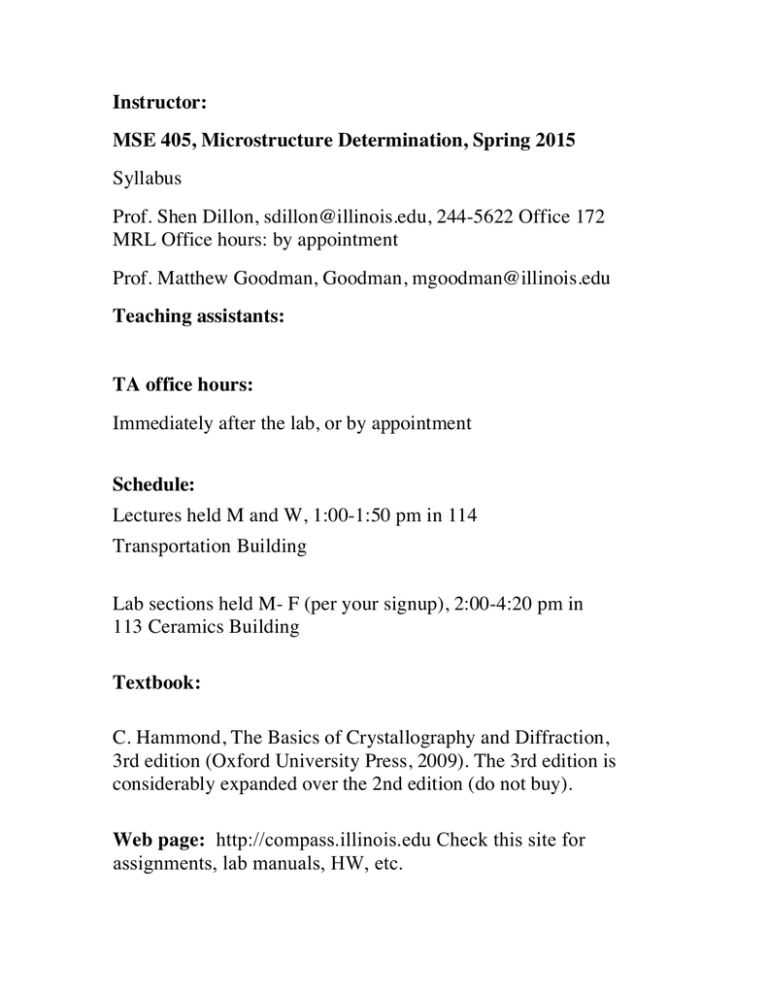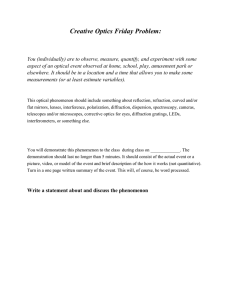Instructor: MSE 405, Microstructure Determination, Spring 2015
advertisement

Instructor: MSE 405, Microstructure Determination, Spring 2015 Syllabus Prof. Shen Dillon, sdillon@illinois.edu, 244­5622 Office 172 MRL Office hours: by appointment Prof. Matthew Goodman, Goodman, mgoodman@illinois.edu Teaching assistants: TA office hours: Immediately after the lab, or by appointment Schedule: Lectures held M and W, 1:00­1:50 pm in 114 Transportation Building Lab sections held M­ F (per your signup), 2:00­4:20 pm in 113 Ceramics Building Textbook: C. Hammond, The Basics of Crystallography and Diffraction, 3rd edition (Oxford University Press, 2009). The 3rd edition is considerably expanded over the 2nd edition (do not buy). Web page: http://compass.illinois.edu Check this site for assignments, lab manuals, HW, etc. Additional Texts: C. Suryanarayana, X­Ray Diffraction: A Practical Approach (Grainger Reserve) M. M. Woolfson, An Introduction to X­ray Crystallography (eBook, http://dx.doi.org/10.1017/CBO9780511622557) Excellent learning applets available on the web: Crystal structures: http://www.jcrystal.com/steffenweber/ java.html Fourier Transforms: http://www.falstad.com/fourier/ Optical diffraction from a grating: http://www.phy.ntnu.edu.tw/ntnujava/index.php?topic=129.0 Optics: http://www.cabrillo.edu/~jmccullough/Applets/optics.html or www.neubert.net Pole figures: http://aluminium.matter.org.uk/content/html/eng/ default.asp? catid=100&pageid=1039432491 Stereograms: http://www.jcrystal.com/steffenweber/JAVA/jstg/jstg.html Unit cells: http://escher.epfl.ch/escher/ XRD: http://www.matter.org.uk/diffraction/Compendium of additional resources: http://tib.chem.de/en/fachinfo.pl? area=41 Learning objectives: Your goal as a student in this course should be to understand the fundamentals of crystallography, diffraction, and optical microscopy; to understand Raman spectroscopy and nuclear magnetic resonance at an introductory level; and to be able to apply these methods to characterize the microstructure of materials. Exams: There will be a comprehensive final exam (Wed May 13) and a mid-term exam (Wed March 8 in class) Homework: Homework problems will be assigned approximately every three weeks. You should solve the problems either with your lab group or independently. If you have difficulty knowing how to approach the problems, then I encourage you to approach the teaching assistants for assistance. A penalty of 33% per day (linear decay, including weekend days) will be taken for late homework. iclicker problems: iclicker will be required to answer iclicker questions given during class Laboratory: The laboratory experiments will give you hands­on experience in x­ray diffraction, optics, NMR, and Raman spectroscopy. Prelab assignments are posted on Compass and must be completed by the group before arriving in lab. TAs will collect prelab work at the start of each lab. You must read the lab manual and rubric for the lab you will be participating in that week. No late prelab work will be accepted. Showing up late or without safety equipment will result in a zero for prelab credit. You will work in groups of ~3 and each group will turn in a joint report and analysis of the experiments. Each experiment extends over 2 weeks. The final laboratory report will be due at the start of the laboratory one week after the completion of each lab. A penalty of 25% per day (linear decay, including weekend days) will be taken for late lab reports. Attendance: The TAs will take attendance in the lab. If you need to be absent from a lab for a justified reason (sickness, job interview or family emergency) contact your TA in advance. Your TA will arrange for you to make up the session by coming on a different day. Unexcused absences result in a loss of 25% of the credit for that lab report per day missed. Effort of lab group members: All members of each lab group should perform their fair share of the work involved. If you are concerned that a member of your lab group is not contributing adequately, work as a team to divide responsibilities fairly. If the problem persists, contact Prof. Shoemaker. Ethics: Plagiarism of text, data, figures, graphs, etc., is strictly not allowed. Instances of plagiarism will result in a zero grade for the assignment for all authors. Please read and understand the rules: www.library.uiuc.edu/learn/research/academicintegrity.html Instances in which answers are copied (from any source, including references, classmates, or old answer sets) will result in a zero grade for that assignment. Safety is of paramount importance: At no time will unsafe operating procedures or behavior be tolerated. Read the safety instructions at the start of each lab manual before beginning work. You must follow the TA’s instructions and proper safety protocols at all times. The laboratory contains high voltage, powerful lasers, chemical hazards, and high temperature equipment. You are required to bring your own safety glasses, closed­toe shoes, and long pants to every laboratory. No food or drink is allowed in 113 Ceramics (or any Lab!). Showing up late or without safe attire will result in a zero for prelab credit. Laboratories include use of X-ray and laser equipment. In order to use this equipment you MUST complete the appropriate safety training prior to lab (https://www.drs.illino is.edu/training/ ) . If you did not take the general safety training (MSE 307), then you will also need to take this training. This will be your first assignment and printed proof of completion will be submitted for our records. Grading: The following weighting factors will be used to determine your final grade: 10% iclicker problems 10% homework problems 15% Mid-term exam 20% Final exam (cumulative) 45% Lab reports + Pre-lab assignments (grade added to lab Grade) Note: peer evaluations will be filled out by each group member at the end of the semester. Partial credit will be given for labs if your group members rate you low (0-100%).

